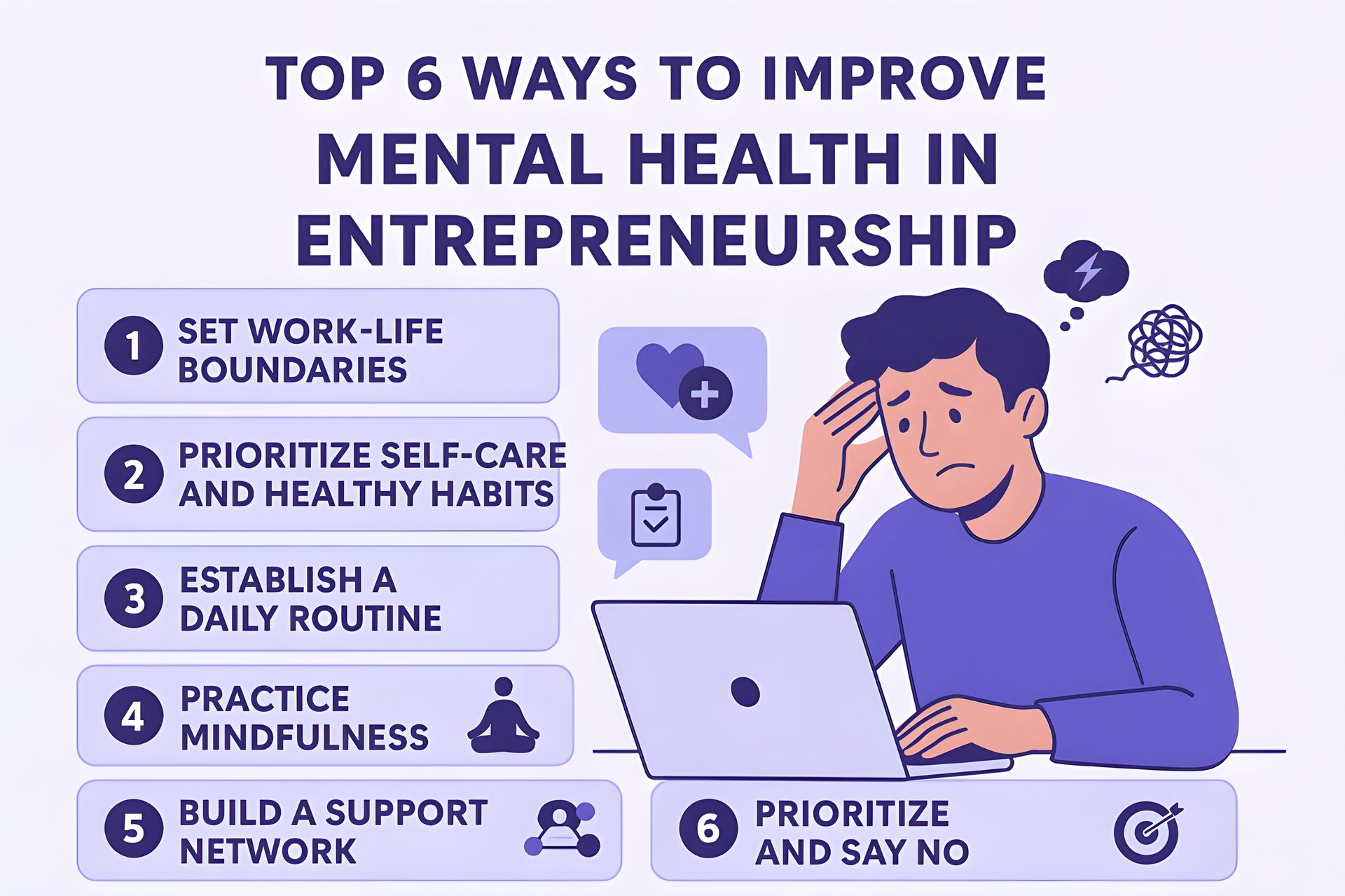
Top 6 Ways to Improve Mental Health in Entrepreneurship
Launching a startup brings excitement — but also intense pressure. In fact, research shows nearly 88% of entrepreneurs struggle with mental health issues, and about 72% report their startup journey has harmed their well-being. Young founders often wrestle with anxiety, chronic stress and entrepreneur burnout. The good news is that by taking practical steps—framed here as mental health strategies for startup founders—you can reduce stress and build resilience. Below are six evidence-backed ways to protect your mind while growing your business. (If you’ve been wondering how to improve mental health as a young entrepreneur, these tips offer real-world guidance.)
1. Stress Management in Startups: Set Work-Life Boundaries
Unplugging from work is key to stress management in startups. Without limits, work can bleed into all hours and fuel anxiety. “Establishing clear boundaries and owning your schedule prevents burnout,” notes a Silicon Valley investor. To put this in practice:
- Turn off notifications after hours. Decide on a fixed time to switch off email and chat alerts so you can recharge outside of work.
- Schedule downtime with loved ones. Block out evenings or weekends for family and friends without work interruptions.
- Clearly communicate your availability. Let your team know when you are “on” or “off” the clock to minimize late-night pings.
- Learn to say “No.” Avoid overcommitting; as one coach warns, “Saying yes too often is a clear path to burnout" Protecting your personal time ultimately boosts productivity and well-being.
2. Mental Wellness for Entrepreneurs: Prioritize Self-Care and Healthy Habits
Physical health strongly affects mental resilience. Even busy founders can carve out moments for self-care. For example, short high-intensity workouts (like HIIT routines) efficiently fit into hectic schedules and help relieve stress. Likewise, meditation, deep breathing or quick walks act as stress-management techniques that mitigate overwhelm. Nutrition and rest matter too – a balanced diet and staying hydrated provide the energy your brain needs, while adequate sleep (7–8 hours) is essential to recharge. Key tips include:
- Exercise regularly. Even brief workouts build energy and reduce anxiety
- Prioritize sleep. Make sleep non-negotiable. Founders report feeling much better after simply getting enough rest.
- Take intentional breaks. Work in focused intervals (e.g. 90 minutes) and then pause for a 15–20 minute break to stretch, breathe deeply, or step outside.
- Eat well and hydrate. A nutritious diet and plenty of water fortify your mood and concentration
In short, treating exercise, sleep and healthy eating as must-dos (not afterthoughts) creates the foundation for mental wellness during startup life.
3. Mental Health Strategies for Startup Founders: Daily Routine & Time Management
A chaotic schedule breeds stress. In contrast, a structured daily routine can restore balance. Plan each day in advance, including work tasks and personal time. For instance, use a calendar or planner to block off work sprints and breaks, so that work doesn’t spill into all hours Entrepreneurs who stick to a routine – consistent wake/sleep times, regular meals, scheduled downtime – report lower stress levels. When overwhelmed, break big goals into smaller steps and “course correct” quickly if you fall behind.
- Use time blocks. Divide your day into work and rest blocks. Allocating “no-work” slots (e.g. lunch breaks, family time) ensures you truly disconnect.
- Maintain consistency. Go to bed and wake up at similar times daily. Eating meals and exercising on a schedule stabilizes mood.
- Plan and prioritize tasks. Each morning (or the night before), list your top 2–3 tasks. If new demands crop up, evaluate them against your key goals before saying yes. This focus prevents mental overload.
By creating a predictable routine and managing your time, you minimize constant decision fatigue and give your mind much-needed breathing room.
4. Mindfulness Practices to Reduce Entrepreneur Burnout
Mindfulness – staying present and reflective – is a powerful antidote to constant stress. Studies emphasize that meditation and self-reflection are effective ways to stave off stress. In practice, dedicate a few minutes daily to calm your mind. For example, begin or end each day by journaling or meditating. As one tech founder explains, even 3–5 minutes of breathwork or meditation before a busy day can “help [you] go to bed feeling good and start [the] day on a positive note". Quick techniques to try:
- Daily check-ins: Keep a simple mood journal or use a meditation app to log your emotional state. Research shows that “regularly tuneing into your emotions" helps you recognize stress early. When you spot a downtrend (e.g. feeling anxious more often), you can take corrective action sooner.
- Short meditations or breathing breaks: Whenever you feel overwhelmed, pause for a minute of deep breathing. Even 5 minutes of focused breathing or guided meditation can reset stress hormones and improve clarity.
- Mindful routines: Practice mindfulness in daily tasks (eat lunch away from your desk, take a walking meeting, etc.) to break the autopilot cycle. Wearables or apps (like meditation timers or breathing cues) can also help cultivate calm awareness.
In essence, these practices train the mind to step off the startup treadmill for a moment. Entrepreneurs who proactively prioritize mental health through mindfulness often report better well-being and work performance.
5. Relatable Mental Health Tips for New Entrepreneurs: Build a Support Network
Running a startup can feel lonely, but reaching out makes a big difference. Many founders hesitate – only about 23% report ever seeing a therapist – yet expert advisors urge change. Prominent investors and entrepreneurs (like Brad Feld) promote therapy as a tool for growth, not just for crises. Talk about mental health openly with peers and mentors to normalize it. As one founder found when burning out, “investing in myself with exercise, mindfulness and therapy” was key to recovery.
- Lean on peers and mentors. Join founder meetups or online groups. Sharing struggles with people who “get it” can provide relief and practical advice.
- Seek professional help. If stress or anxiety feels unmanageable, consider talking to a counselor or coach. Research shows that good mental health correlates with higher productivity and creativity.
- Use startup resources. Participate in programs (like accelerator networks or coworking communities) that include mental health workshops. Initiatives such as Y Combinator’s Founder’s Mental Health Pledge encourage making support available to founders.
In short, remember you’re not alone. Finding support – whether from a mentor, community, or therapist – is one of the most effective ways to sustain your mental wellness in entrepreneurship.
6. How to Improve Mental Health as a Young Entrepreneur: Prioritize and Say No
Finally, guard your limited time and energy. Young founders often try to do everything, but having too much on your plate breeds burnout. Adopt a selective, quality-over-quantity mindset. This means learning to refuse or delegate tasks that aren’t aligned with your priorities. As an NFL pro-turned-entrepreneur advises, "Know when to say no and refuse commitments that don’t align with your key goals". Alongside this, redefine success to include well-being – not just funding or sales. For example, one entrepreneur suggests viewing success holistically: it’s about meeting goals while caring for your health. Tips for this mindset shift:
- Prioritize ruthlessly. List tasks by impact. Use tools like the Eisenhower Matrix (urgent vs. important) or simple time-blocking to focus on high-impact work.
- Say “no” strategically. Turning down irrelevant projects frees you to excel on what matters. This protects your mental energy and prevents overload.
- Redefine success. Remind yourself that a healthy startup culture and personal well-being are signs of success too. Embracing balance (not just hustle) is a sustainable route to long-term success.
By setting realistic goals and guarding your schedule, you break the cycle of burnout before it starts.

Key Takeaways: Mental health struggles are common among startup founders, so address them proactively. Establish clear boundaries and routines to reduce stress. Prioritize self-care (sleep, exercise, nutrition) and practice mindfulness. Build a support network – mentors, peers, professionals – and don’t hesitate to use it. Implementing these strategies can help young entrepreneurs stay mentally well, focused, and better equipped to achieve their startup dreams.
Sources: Expert and research insights on entrepreneurship and mental health